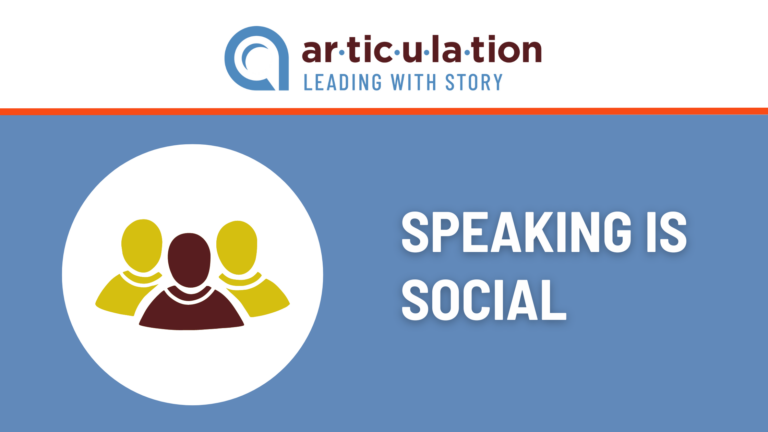Speaking is social: The third Threshold Concept for Learning to be an Effective Speaker.
Waking Life inspired our Acacia Duncan to explore how speaking truly connects us. From theatre to coaching, she has learned that speaking is more than words—it’s about understanding and communion. Read a bit about her journey here.
*******
In 2001 a movie came out that would impact the rest of my life.
Waking Life by Richard Linklater.
I remember this moment where one person says to another:
“When I say “love,” the sound comes out of my mouth and it hits the other person’s ear, travels through this Byzantine conduit in their brain, through their memories of love or lack of love, and they register what I’m saying and they say yes, they understand.
But how do I know they understand? Because words are inert. They’re just symbols. They’re dead, you know? And so much of our experience is intangible. So much of what we perceive cannot be expressed. It’s unspeakable.
And yet, when we communicate with one another, and we feel that we’ve connected, and we think that we’re understood, I think we have a feeling of almost spiritual communion. And that feeling might be transient, but I think it’s what we live for.”
This moment spoke to my young theatre-making heart. I wanted to seek that feeling, however transient it might be. And I have, as a director and actor. Now, eight years into my time as a communication coach and trainer, my passion has expanded to helping others experience this incredible feeling of connection when you say something and you’re truly understood.
Because speaking is a social activity– it’s one of our Threshold Concepts for learning to become an effective speaker. Ultimately, speaking is about sharing with another human being.
This beautiful side of communication, that it allows us to truly connect with one another, is lovely in theory. But it is thorny in practice. Because it means that speaking always carries risk. I can never know that when I “say love” you will understand what I mean. The listener gets to create the meaning of what we say. On top of that, speaking only happens in a singular moment, and the meaning is affected by the circumstances of that moment.
We can mitigate the risk of misunderstanding and exposure; heck it’s one of the many things we help our clients to do, but we can never remove it entirely. Sometimes that can feel untenable– especially the more we care about what we are trying to achieve when we speak.
And yet, as I think back to that junior in college, dreaming of making a difference in the world, I know that it is a risk worth taking.

*******
About The Threshold Concepts for Learning to be an Effective Speaker
Articulation has established Six Threshold Concepts for Learning to be an Effective Speaker. Embrace all six and practice the rituals, habits and patterns associated with them to become a better speaker.
- Speaking is Habitual
- Speaking is Embodied
- Speaking is Social
- Speaking Contains Multiple Genres
- Speaking is Messy
- Speaking Requires Feedback
Learn more in our introduction to the Threshold Concepts.


